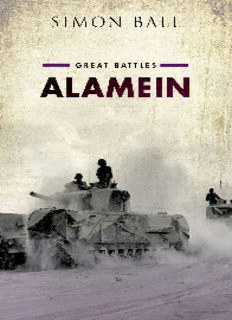
Alamein PDF
Preview Alamein
OUPCORRECTEDPROOF–FINAL,10/5/2016,SPi ALAMEIN OUPCORRECTEDPROOF–FINAL,10/5/2016,SPi OUPCORRECTEDPROOF–FINAL,10/5/2016,SPi GREAT BATTLES ALAMEIN SIMON BALL 1 OUPCORRECTEDPROOF–FINAL,10/5/2016,SPi 3 GreatClarendonStreet,Oxford,OXDP, UnitedKingdom OxfordUniversityPressisadepartmentoftheUniversityofOxford. ItfurtherstheUniversity’sobjectiveofexcellenceinresearch,scholarship, andeducationbypublishingworldwide.Oxfordisaregisteredtrademarkof OxfordUniversityPressintheUKandincertainothercountries ©SimonBall Themoralrightsoftheauthorhavebeenasserted FirstEditionpublishedin Impression: Allrightsreserved.Nopartofthispublicationmaybereproduced,storedin aretrievalsystem,ortransmitted,inanyformorbyanymeans,withoutthe priorpermissioninwritingofOxfordUniversityPress,orasexpresslypermitted bylaw,bylicence,orundertermsagreedwiththeappropriatereprographics rightsorganization.Enquiriesconcerningreproductionoutsidethescopeofthe aboveshouldbesenttotheRightsDepartment,OxfordUniversityPress,atthe addressabove Youmustnotcirculatethisworkinanyotherform andyoumustimposethissameconditiononanyacquirer PublishedintheUnitedStatesofAmericabyOxfordUniversityPress MadisonAvenue,NewYork,NY,UnitedStatesofAmerica BritishLibraryCataloguinginPublicationData Dataavailable LibraryofCongressControlNumber: ISBN –––– PrintedinGreatBritainby ClaysLtd,StIvesplc LinkstothirdpartywebsitesareprovidedbyOxfordingoodfaithand forinformationonly.Oxforddisclaimsanyresponsibilityforthematerials containedinanythirdpartywebsitereferencedinthiswork. OUPCORRECTEDPROOF–FINAL,10/5/2016,SPi To Helen OUPCORRECTEDPROOF–FINAL,10/5/2016,SPi OUPCORRECTEDPROOF–FINAL,10/5/2016,SPi FOREWORD Forthosewhopractisewarinthetwenty-firstcenturytheideaofa ‘greatbattle’canseemnomorethantheechoofaremotepast.The names on regimental colours or the events commemorated at mess dinnersbearlittlerelationshiptopatrollingindustyvillagesorwaging ‘wars amongst the people’. Contemporary military doctrine down- playstheideaofvictory,arguingthatwarsendbynegotiationnotby the smashing of an enemy army or navy. Indeed it erodes the very division between war and peace, and with it the aspiration to fight a culminating‘greatbattle’. Andyettotakebattleoutofwaristoredefinewar,possiblytothe point where some would argue that it ceases to be war. Carl von Clausewitz,whoexperiencedtwo‘greatbattles’atfirsthand—Jenain and Borodino in —wrote in On War that major battle is ‘concentrated war’, and ‘the centre of gravity of the entire campaign’. Clausewitz’sremarks relatedto the theoryof strategy.He recognized thatinpracticearmiesmightavoidbattles,buteventhentheefficacy oftheiractionsreliedonthelatentthreatoffighting.WinstonChurchill saw the importance of battles in different terms, not for their place within war but for their impact on historical and national narratives. Hisforebear,theDukeofMarlborough,foughtfourmajorbattlesand namedhispalaceafterthemostfamousofthem,Blenheim,foughtin . Battles, Churchill wrote in his life of Marlborough, are ‘the principal milestones in secular history’. For him, ‘Great battles, won or lost, change the entire course of events, create new standards of values,newmoods,newatmospheres,inarmiesandnations,towhich allmustconform’. vii OUPCORRECTEDPROOF–FINAL,10/5/2016,SPi FOREWORD Clausewitz’s experience of war was shaped by Napoleon. Like Marlborough, the French emperor sought to bring his enemies to battle. However, each lived within a century of the other, and they fought their wars in the same continent and even on occasion on adjacent ground. Winston Churchill’s own experience of war, which spanned the late nineteenth-century colonial conflicts of the British Empireaswellastwoworldwars,becameincreasinglydistancedfrom thesortsofbattleheandClausewitzdescribed.InChurchillrode inacavalrychargeinabattlewhichcrushedtheMadhistforcesofthe Sudan in a single day. Four years later the British commander at Omdurman, Lord Kitchener, brought the South African War to a conclusion after a two-year guerrilla conflict in which no climactic battleoccurred.BothChurchillandKitchenerservedasBritishCabinet ministers in the First World War, a conflict in which battles lasted weeks,andevenmonths,andwhich,despitetheirscaleandduration, didnotproduceclear-cutoutcomes.The‘Battle’ofVerdunranforall but one month of and that of the Somme for five months. The potentiallydecisivenavalactionatJutlandspannedamoretraditional twenty-four-hour timetable but was not conclusive and was not replicated during the war. In the Second World War, the major struggle in waters adjacent to Europe, the‘Battle’of theAtlantic,was foughtfromtoearly. Clausewitzwouldhavecalledthesetwentieth-century‘battles’cam- paigns, or even seen them as wars in their own right. The determin- ation to seek battle and to venerate its effects may therefore be culturally determined, the product of time and place, rather than an inherent attribute of war. The ancient historian Victor Davis Hanson has argued that seeking battle is a ‘western way of war’ derived from classical Greece. Seemingly supportive of his argument are the writ- ings of Sun Tzu, who flourished in warring states in China between twoandfivecenturiesbeforethebirthofChrist,andwhopointedout thatthemosteffectivewayofwagingwarwastoavoidtherisksand dangers of actual fighting. Hanson has provoked strong criticism: those who argue that wars can be won without battles are not only viii OUPCORRECTEDPROOF–FINAL,10/5/2016,SPi FOREWORD to be found in Asia. Eighteenth-century European commanders, deploying armies in close-order formations in order to deliver con- centrated fires, realized that the destructive consequences of battle for their own troops could be self-defeating. After the First World War, Basil Liddell Hart developed a theory of strategy which he called ‘the indirect approach’, and suggested that manoeuvre might substitute for hard fighting, even if its success still relied on the inherentthreatofbattle. Thewinnersofbattleshavebeencelebratedasheroes,andnations have used their triumphs to establish their founding myths. It is preciselyforthesereasonsthattheirlegacieshaveoutlivedtheirdirect politicalconsequences.Commemoratedinpainting,verse,andmusic, marked by monumental memorials, and used as the way points for the periodization of history, they have enjoyed cultural afterlives. These are evident in many capitals, in place names and statues, not least in Paris and London. The French tourist who finds himself inaLondontaxitravellingfromTrafalgarSquaretoWaterlooStation shouldreflectonhisorherowndomesticperegrinationsfromtheRue de Rivoli to the Gare d’Austerlitz. Today’s Mongolia venerates the memory of Genghis Khan while Greece and Macedonia scrap over therightstoAlexandertheGreat. Thisseriesofbookson‘greatbattles’tipsitshattobothClausewitz andChurchill.Eachofitsvolumessituatesthebattlewhichitdiscusses inthecontextofthewarinwhichitoccurred,buteachthengoeson to discuss its legacy, its historical interpretation and reinterpretation, its place in national memory and commemoration, and its manifest- ationsinartandculture.Thesearenoteasybookstowrite.Thevictors weremoreoftencelebratedthanthedefeated;theeffectoflossonthe battlefield could be cultural oblivion. However, that point is not universally true: the British have done more over time to mark their defeatsatGallipoliinandDunkirkinthantheirconquerors onbothoccasions.Forthehistoryofwartothriveandbeproductive itneedstoembracetheviewfrom‘theothersideofthehill’,tousethe DukeofWellington’swords.ThebattletheBritishcallOmdurmanis ix
Description: